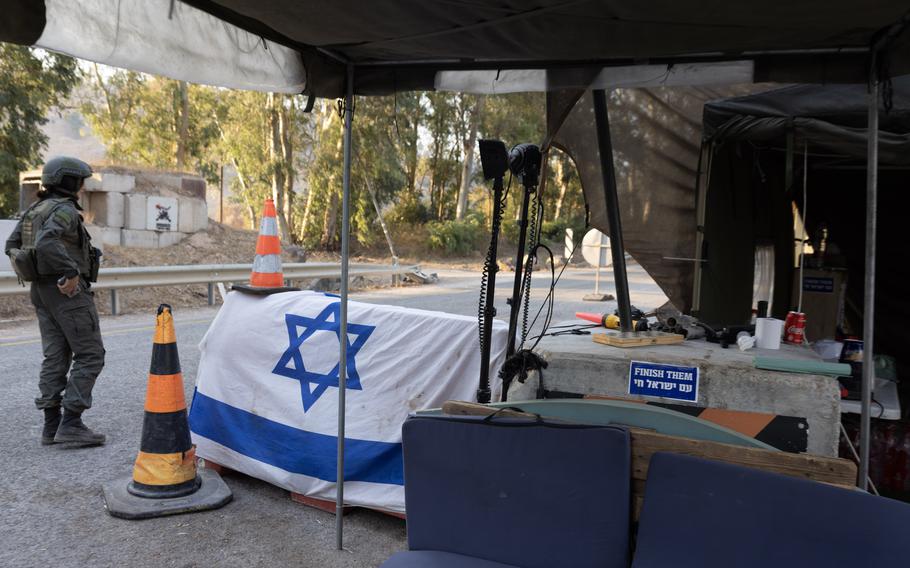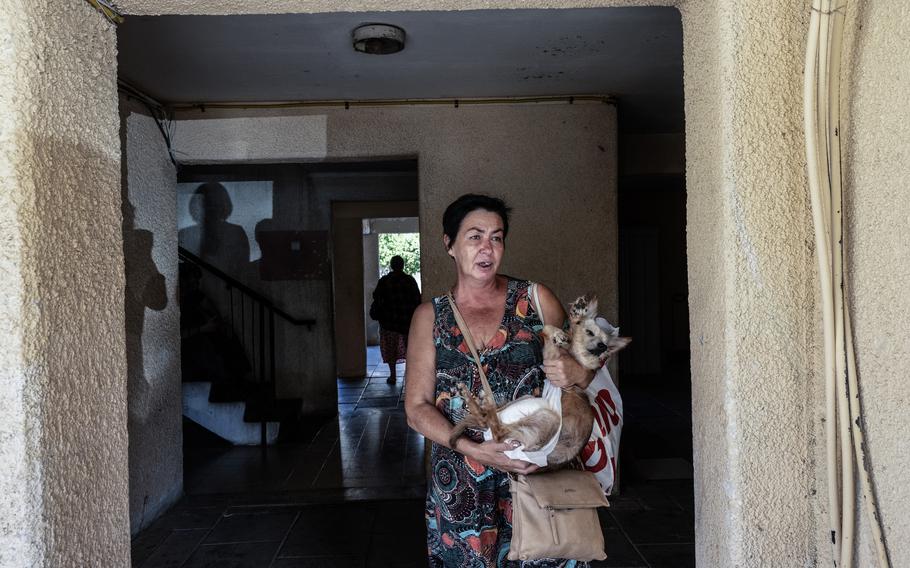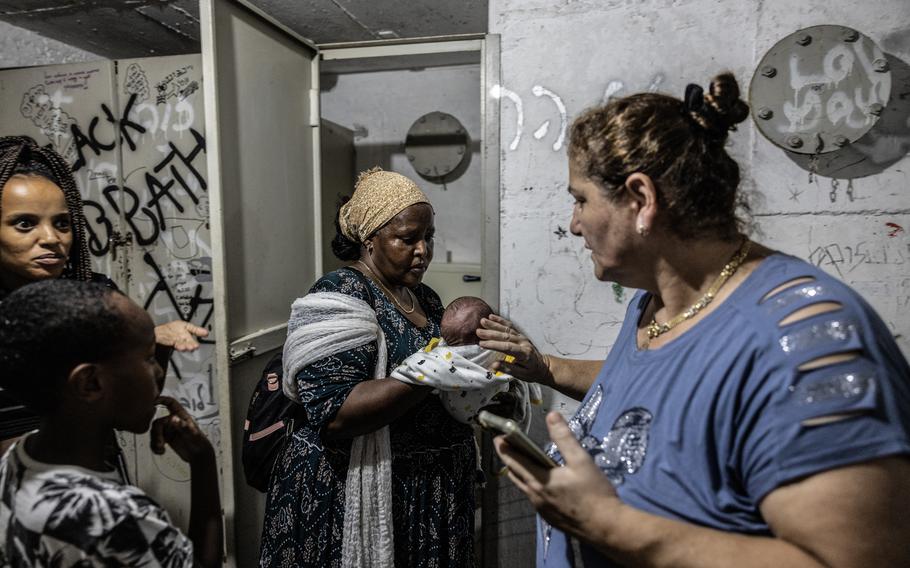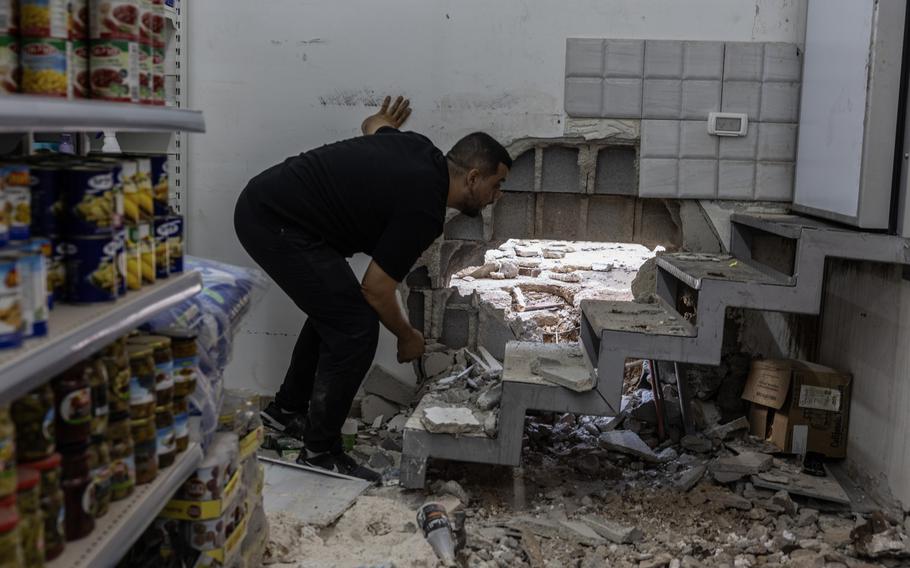
A sign that reads “Finish them All” at a checkpoint on the outskirts of Kiryat Shmona, Israel, near the border of Lebanon in northern Israel, on Monday, Sept. 23, 2024. (Heidi Levine for The Washington Post)
KIRYAT BIALIK, Israel — Tel Aviv awoke to air raid sirens Wednesday after Hezbollah fired a long-range missile toward Israel’s commercial center, the deepest strike yet by the militant group and a preview of what Israelis fear could be a war without limits.
Israel’s air defense systems intercepted the missile Wednesday before impact, as it has the majority of projectiles fired from Lebanon in recent days. Across northern Israel, though, the howl of sirens and the race to safe rooms have become features of daily life since the military escalated its campaign against Hezbollah.
As this traumatized country approaches the anniversary of Oct. 7, and officials warn of hard days ahead, many are haunted by uncertainty. Over 11 months of rocket, drone and missile attacks on Israel’s north by Hezbollah, the Iran-backed organization that is Lebanon’s most powerful military and political force, the group has showcased only part of the sophisticated weapons arsenal it has spent years building. Everyone here is bracing for the worst — it’s become a dark national pastime.
“We’ve been waiting for it,” said Ran Zohar, 24, of the morning missile, sitting at an outdoor coffee shop with his girlfriend in Tel Aviv hours after the skies cleared. “We don’t have anything else to do.”

Elena Kotz, 54, holds her dog wearing a diaper as she takes shelter on the bottom floor of her residential building during air sirens in Kiryat Bialik, Israel, near Haifa, on Tuesday, Sept. 24, 2024. Kotz said her dog is too old to make it up and down the stairs during the sirens and suffers from fear. (Heidi Levine for The Washington Post)
An hour and a half away, Elena Kotz, 54, emerged Tuesday from the bare-bones safe room in her building’s bottom floor. Another air raid warning had just sounded in her Haifa suburb of Kiryat Bialik. “Nobody knows what will happen,” she said. “We are preparing our safe room to sleep in but …” she trailed off and shrugged.
Israel’s northernmost border communities have contended for years with rocket fire from Hezbollah, and more than 67,000 residents have been displaced since Oct. 7. Over the weekend, the Israeli military broadened its restrictions to include the Haifa Bay area, the Israeli-occupied Golan Heights, more parts of the Galilee and other areas reaching up to 40 miles south from the Lebanese border.
Schools are closed, outdoor gatherings of more than 10 people are forbidden and only workplaces with shelters can remain open. Major hospitals have moved underground.
Heavy Israeli strikes across Lebanon this week have killed more than 600 people, according to the country’s Health Ministry, which does not distinguish between combatants and civilians but said at least 50 children, 94 women and nine paramedics were among the dead. The Israel Defense Forces said Tuesday it had hit 1,500 “terrorist infrastructure targets” from above and, on Wednesday, the IDF chief told troops to prepare for a possible ground invasion.
Hezbollah has responded by firing hundreds of projectiles, according to the IDF, including new long-range Fadi rockets.
To avoid another prolonged war, “we need to give them a onetime hard blow so it can be calm again,” David Even Tzur, the mayor of the coastal city of Kiryat Yam and head of the Haifa Bay Municipalities Association, told The Washington Post.

Ethiopian Ukrainian Israelis in a bomb shelter of their residential building during air sirens in Kiryat Bialik, Israel, on Tuesday, Sept. 24, 2024. Two houses were hit in Kiryat Bialik and vehicles were damaged following a wave of rocket and drone attacks from Hezbollah into Israeli territory on Sunday. (Heidi Levine for The Washington Post)
Local authorities are prepared “for two weeks, a month maximum” of heavy bombardments, he said. Emergency teams have readied safe rooms, stocked up on food and water to deliver to families in need and put psychologists on call.
But if it lasts longer “it will be Oy vavoy,” he said, using an ominous Yiddish expression. “With God’s help we will be able to normally celebrate Rosh Hashanah,” he said, referring to the Jewish New Year on Oct 2.
Last week Israeli Prime Minister Benjamin Netanyahu made returning evacuees to their homes in the north an official war aim, alongside the initial goals of destroying Hamas and bringing back the hostages held by the group.
But in recent days, more people in the north have unofficially moved south.
Hezbollah may be calculating that “if a full-scale conflict would break out, not only would Israel not be able to return residents to the north, but hundreds of thousands more would be displaced,” said Michael Horowitz, head of intelligence at Le Beck International risk consultancy.
Israel has lived through numerous rounds of anxious waiting this year. In April, Tehran fired hundreds of missiles and explosive drones toward Israel in retaliation for an Israeli strike on Iranian commanders in Syria. Most were intercepted with help from a U.S.-backed coalition, and the situation quickly calmed. In late August, the country feared another major Iranian attack after the assassination of Hamas leader Ismail Haniyeh in Tehran. It has yet to come.
Israelis in the north, facing a second year of war, say this time feels different.
With each air raid, Alise Zvinatzki, 23, and her dog, Kiara, grow more nervous. She shares the same safe room as Kotz in Kiryat Bialik, and has filled it with essentials such as water, toilet paper and poop bags for their dogs, who are not popular with all the residents. Kotz has put her elderly dog in a diaper and carries him up and down the stairs at the sound of each siren.
Zvinatzki’s father works nearby in the city’s industrial zone, which includes the Rafael defense firm — a weapons manufacturer that has been targeted by Hezbollah. The group says its attacks are focused on Israeli military sites, but their munitions are imprecise and often fall indiscriminately. On Sunday, a rocket slammed into a nearby residential block, hitting two buildings and injuring three people.
Zvinatzki slept in her building’s safe room throughout the 2006 war. She is mentally preparing for that again, she said.
“I think that there needs to be a war,” she said. “To move Hezbollah away from the border so the north won’t be like Gaza.”

A man inspects the damage inside a supermarket in Tamra, an Arab city in northern Israel, that sustained significant damage following overnight missile strikes by Hezbollah on Tuesday, Sept. 24, 2024. (Heidi Levine for The Washington Post)
But for how long? “Until the end,” she said, so there will be “quieter days.”
In another communal safe room on the same block, the building’s residents fretted over how long they could last in the stifling space. Nobody had stored water or prepared beds; the toilet didn’t work. An elderly resident struggled to plug in a recently purchased fan. Not all the residents, a mix of Israeli, Ethiopian, Ukrainian and American Jews, could communicate with each other. Graffitied on the wall was an evil eye, a symbol to ward off bad spirits, and Israel’s wartime tagline: Together we will win.
A clear majority of Israelis support the war in Gaza and the escalation in Lebanon. For Palestinians and others opposed to the fighting and the heavy civilian toll, there is a different kind of fear.
“We are afraid to say anything against the war, like Gaza” said Maysoon, a Palestinian citizen of Israel, citing the legal problems some have faced for criticizing Israel’s military campaigns. She spoke on the condition she be identified by her first name, fearing retaliation by the state. “So we stay silent,” she said.
Maysoon was out shopping Tuesday at a mall in Sakhnin, a northern Arab city that has come under fire in recent days. She blamed the Israeli government for not reaching a cease-fire deal in Gaza, Hezbollah’s main condition for ceasing its cross-border attacks.
“They could have had an agreement,” she said. Now “there is no chance for peace.”